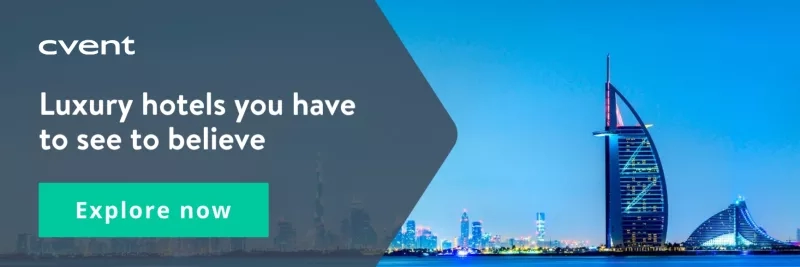
The competition for brand attention and bookings in the luxury hotel market is fierce. The high-end hospitality industry is on a winning streak, with a 4.3 percent compound annual growth rate expected through 2024 at least.
Luxury hotels depend on advertising to make their services and amenities stand out from the glitzy competition. But what makes luxury hotel advertising effective? Read on for 9 must-know strategies shared by the best luxury hotel ads — with examples from the properties that do it best.
Explore 9 ways to make luxury hotel ads stand out:
1. Create a sense of exclusivity with copy.
Your audience wants a little pampering, even in your word choices. They also want to feel a bit above the fray when they choose your hotel. Build anticipation for your sophisticated accommodations with content that reflects your authentic voice as a brand and destination. Foodie-favorite destinations increase interest with rich menu descriptions while experiential hotels attract adventurers with headlines about unforgettable luxe opportunities. Know your audience, and be true to your brand.
Luxury hotel marketing made simple
Today, the concept of luxury is evolving and will vary based on your customer profiles. To interest Millennials, weave brief stories about the luxury experiences your hotel and location offers. Dunton Hot Springs Resort in Colorado, for example, offers a summer-only Dunton River Camp glamping experience. For high-end-business travelers, create and advertise Stay, Work, Play packages with copy that focuses on the ROI of booking with your hotel.
Example: Small luxury hotels of the world. This hotel group trusted guests to make up their own minds with a minimalist campaign that prized independent thought. The ads for Small Luxury Hotels of the World skipped images altogether in favor of bold copy, proclaiming: “A picture paints a thousand words. But this ad is for people unaffected by retouched advertising images.”
2. Tout your sophisticated hotel brand and reputation.
Branding is about more than your logo design or color palette. Your hotel’s brand will guide the look and feel of public spaces, guest rooms, and ads, but it also reflects your reputation, supports your image, and inspires customer loyalty. Brand carries recognition.
Zoom in close on what makes your hotel distinctive, and clarify that in your hotel advertising. Some possible qualities to trumpet:
White-glove customer service.
Romantic decor, on-site F&B, and services (such as a spa that caters to couples).
Luxe business amenities (such as an on-call barista for business meetings).
Stunning ocean views.
Elegant rooftop dining.
Your property may have more than one of these qualities, but keep your advertising focus on the offerings your guests talk about — at checkout and online.
Example: The Hoxton. This luxury boutique hotel, with locations in London, Paris, and New York, is known for making guests feel at home, even in far-flung cities. Immersive experiences and activities curated by local experts turn each Hoxton city into the guest’s town, too. Guests are so enamored, they clamor to bring the feeling home with them. The HoxShop offers a line of exclusive, Hox-branded items including bathroom products, sheets, mugs, and products by local creators.
Grow faster with the right hotel advertising
3. Count on user-generated content.
Word of mouth is one of the most effective forms of marketing. User-generated content, whether from guests or influencers, is advertising that can be a tremendous draw for new customers. While UGC is a low-cost option, it has potential to boost engagement and earn new business. Endorsements made by celebrities are less likely to sway millennials — guest reviews, Instagram photos, and personal recommendations are trusted sources of information.
Example: The Ritz-Carlton. This famed hotel doesn’t rest on its history or name-recognition laurels. To sustain buzz, the Ritz-Carlton curates an Instagram page using images and content posted by guests and influencers under the hashtag #rcmemories. In addition to encouraging engagement, the hotel group clarifies terms and conditions for hashtag usage. Discover how to build a social media ad strategy to reach your target luxury consumers.
4. Use video to give an insider’s view of your luxury offerings.
Video content earns more engagement from views, reactions, comments, and shares than still images. In a world of non-stop social scrolling, images and text are easy to skim, but video content earns more focus. Users are more likely to watch an engaging video than they are to read text. Consumers view an average of one hour of mobile video per day, and that number is rising — making video ad content an obvious winner.
Give prospective guests a tour of your hotel, focusing on luxury amenities such as the spa or in-room bartenders. Other ideas include your star-chef creating a seasonal dish, a tour of nearby experiences, and detailed suite tours.
Video marketing tips for hotels:
Go for professional quality. Low-quality videos don’t earn engagement, but well-made videos and thoughtful campaigns are valuable and shareable.
Know your strengths. Focus on what your brand does well, and show it off. Off-brand messages may look insincere or dishonest.
Include text or subtitles. More than 85 percent of people watch mobile videos with the sound off — closed-captioned videos allow you to convey the whole message without the need for sound.
Use music to set a mood. People may keep their sound off, but that doesn’t mean you should skip sound entirely. Entice sound-on watchers with music that conveys the appropriate feeling — romantic, relaxing, exciting, or otherwise.
Shorter is better. The average attention span for mobile video is less than two minutes. Present your message in a concise video and don’t waste users’ time.
Example: Four Seasons. The Four Season YouTube channel presents fitness videos, getaway inspiration, perfectly curated tour guides, and more. With more than 39,000 YouTube subscribers, they reach a significant audience on the platform, but also share the clips across their social media accounts and on their website.
5. Become a must-know luxury experience resource.
Become the first place potential guests look when they’re planning their next getaway. Show off the opulent packages and incredible experiences you offer, and share ideas targeted to your guest personas. Resources you can build or curate for prospective guests:
Content marketing (blogs, email newsletters, and social posts) that draws attention to local luxury offerings, such as a famed wine bar or high-end shopping district near your property.
A Pinterest board with luxury experience ideas for your location as well as other destinations.
Podcasts. Local experts discuss nearby high-end activities and day-trips.
Detailed sample itineraries so guests feel supported in their luxury travel goals.
An itinerary builder. Guests can create their ideal trip on your website and save it to their account, whether or not they have booked a room.
Packages to capture travelers in the off-season — you may build a relationship with budget-minded individuals who still enjoy indulgences.
Share the availability of these helpful offerings within an ad campaign, or make them the focus of their own campaign.
The best luxury hotel ads encourage dreaming. Prospective guests "see" themselves at your hotel, taking in the exceptional view, enjoying the fine foods and services, and leaving refreshed and rejuvenated.
Example: The Von Braun Space Station. This first-ever "Space Hotel" has an ambitious goal of accepting guests by 2025. The Von Braun Station website showcases its one-of-a-kind view, project updates, and offers free and paid membership options. While the idea seems far-fetched, there’s a lesson to learn: They’ve built a campaign around reaching people relevant to their bottom line — those who want to visit space.
6. Understand there isn’t only one type of luxury guest.
Luxury consumers come in all varieties: Adventuresome singles, romantic couples, refined business travelers, jet-setting families — whomever you intend to draw, target the right audience with your ads.
Example: Park Hyatt. A Park Hyatt ad campaign featured black and white images — faces hidden — with text blocks describing different luxury ideals, encouraging guests to embrace their distinct personal luxuries.
Example: Blackberry Farm. This hotel in the Great Smoky Mountains of Tennessee features kids’ programs for traveling families but also creates opportunities for guests across a variety of interests: Wellness, paintball, fishing, water sports, horseback riding, and more.
Example: The Brown Palace. An ad campaign for this famed hotel in Denver sought to draw consumers nostalgic for vintage luxury. The Brown Palace ads featured elegant and romantic images reminiscent of classic Hollywood.
7. Make taking action easy and luxurious.
Include a single, clear call to action that supports your brand’s message and encourages engagement from your audience. Explore the calls to action across your advertising platforms — newsletter sign up, email campaigns, booking pages, YouTube end screens, social media ads — and create a message the stirs emotion.
While “Book Now” is to the point, an invitation to “Design Your Getaway” may capture the attention of a more specific audience. Speak to the busy traveler with promises that the process is quick and easy. Stir excitement in thrillseekers with encouragement to “Take a Leap.”
Example: Conrad New York Midtown. The Conrad invites guests to “Choose My Stay” or “Discover Dining Options,” which gives the booking experience a customized feel.
Social media users may not be ready to book, so engage them with calls to action that spark wanderlust or create a connection. Rather than implying users must commit to a purchase, encourage them to connect by subscribing to a newsletter or signing up to enter an exclusive trip giveaway.
8. Be available where your guests are.
In an increasingly digital world, users want information at their fingertips — and quickly. Finding a balance in the digital ad space comes down to reaching your guests in an authentic way on the platforms they prefer. Build digital and non-digital techniques into your ad approach to reach the right audience, no matter where they’re booking.
A website and a booking app are only part of the story. A less-intrusive Progressive Web App — rather than a traditional app — minimizes download space and can increase conversions. A website must not only be speedy but should also be mobile-friendly and adhere to Web Accessibility Guidelines.
Target guests with location-based ads to deliver personalized messages. Use geofencing marketing to trigger everything from welcome messages and restaurant vouchers upon check-in, or earn last-minute bookings when you send room deals and exclusive upgrade offers to people attending events.
Don’t discount traditional methods, either. Relying on social-media-only advertising means you may be missing out on key guests. A travel newsletter drops information into travelers’ email inboxes, while a glossy magazine approaches travel advertising in a tangible, touchable way. Ads for Vegas Uncork’d by Bon Appétit — an annual food and wine extravaganza that takes over luxury spaces — feature famous chefs in Las Vegas.
9. Use your history or a unique feature to create a one-of-a-kind image.
Boutique hotels are masters at playing on history to lure guests. The Stanley Hotel’s events schedule includes tours of the historic building, along with astounding stories of ghosts and spirits — fitting for the location that inspired Stephen King’s The Shining.
Example: The Liberty Hotel. This Marriott property in Boston boasts its storied past as the Charles Street Jail, making it a draw for historians, explorers with a penchant for the weird, and architecture buffs alike — while also highlighting local attractions. The hotel plays on the history-meets-contemporary vibe in website copy and social posts, and continually earns spots on Best-Of lists.
Professional architectural photographers have the tools and skills necessary to achieve the ideal lighting, find the right angles, highlight historic characteristics, and portray your property’s top features. A pro is the best option for any hotel — but especially for those with unique stories to tell.
It's time to create the best luxury hotel ads!
Put these ad strategies to use in your next campaign. Then, learn common luxury hotel copywriting clichés and smarter alternatives.






